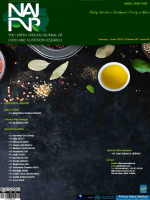Houda Elfane
Laboratory of Biotechnology, Biochemistry, and Nutrition. Training and Research Unit on Nutrition & Food Sciences. Department of Biology. Faculty of Sciences. Chouaib Doukkali University. El Jadida, 24000. Morocco.
Mohamed Mziwira
Ecole Normale Supérieure, Université Hassan II, Casablanca, Morocco
Khadija Sahel
Laboratory of Biotechnology, Biochemistry, and Nutrition. Training and Research Unit on Nutrition & Food Sciences. Department of Biology. Faculty of Sciences. Chouaib Doukkali University. El Jadida, 24000. Morocco
Sanaa El Jamal
Laboratory of Biotechnology, Biochemistry, and Nutrition. Training and Research Unit on Nutrition & Food Sciences. Department of Biology. Faculty of Sciences. Chouaib Doukkali University. El Jadida, 24000. Morocco
Nadia El Mahri
Laboratory of Biotechnology, Biochemistry, and Nutrition. Training and Research Unit on Nutrition & Food Sciences. Department of Biology. Faculty of Sciences. Chouaib Doukkali University. El Jadida, 24000. Morocco.
Loubna Arkoubi Idrissi
Laboratory of Biotechnology, Biochemistry, and Nutrition. Training and Research Unit on Nutrition & Food Sciences. Department of Biology. Faculty of Sciences. Chouaib Doukkali University. El Jadida, 24000. Morocco
Adil Kalili
Laboratory of Biotechnology, Biochemistry, and Nutrition. Training and Research Unit on Nutrition & Food Sciences. Department of Biology. Faculty of Sciences. Chouaib Doukkali University. El Jadida, 24000. Morocco
Naima Errabahi
Laboratory of Biotechnology, Biochemistry, and Nutrition. Training and Research Unit on Nutrition & Food Sciences. Department of Biology. Faculty of Sciences. Chouaib Doukkali University. El Jadida, 24000. Morocco
Rachida Moustakim
Laboratory of Biotechnology, Biochemistry, and Nutrition. Training and Research Unit on Nutrition & Food Sciences. Department of Biology. Faculty of Sciences. Chouaib Doukkali University. El Jadida, 24000. Morocco
Rachida Elouafi
Laboratory of Biotechnology, Biochemistry, and Nutrition. Training and Research Unit on Nutrition & Food Sciences. Department of Biology. Faculty of Sciences. Chouaib Doukkali University. El Jadida, 24000. Morocco
Kaoutar Naciri
Laboratory of Biotechnology, Biochemistry, and Nutrition. Training and Research Unit on Nutrition & Food Sciences. Department of Biology. Faculty of Sciences. Chouaib Doukkali University. El Jadida, 24000. Morocco
Azz El Arab Ahaji
Laboratory of Biotechnology, Biochemistry, and Nutrition. Training and Research Unit on Nutrition & Food Sciences. Department of Biology. Faculty of Sciences. Chouaib Doukkali University. El Jadida, 24000. Morocco
Mohammed El Ayachi
Laboratory of Biotechnology, Biochemistry, and Nutrition. Training and Research Unit on Nutrition & Food Sciences. Department of Biology. Faculty of Sciences. Chouaib Doukkali University. El Jadida, 24000. Morocco
Rekia Belahsen
Laboratory of Biotechnology, Biochemistry, and Nutrition. Training and Research Unit on Nutrition & Food Sciences. Department of Biology. Faculty of Sciences. Chouaib Doukkali University. El Jadida, 24000. Morocco.
Abstract
Background: In the last years, obesity became of interest because of its association with osteoarthritis (OA) which is increasing with the increase of both life expectancy and the prevalence of obesity.
Aims: The objective was to assess the association of obesity with the susceptibility of the lower limbs OA (LLOA) occurrence in women.
Subjects and Methods: The symptomatic susceptibility of the onset of LLOA was evaluated on a sample of women from El Jadida (Morocco) using the Moroccan version of the Western Ontario and McMaster Universities osteoarthritis index (WOMAC) for the lower limbs. Sociodemographic and anthropometric data were collected too using a questionnaire.
Results: The surveyed female population was 45 ± 13 years old mostly obese (77%) with an average BMI: 29.18 ± 5.29 and a WHR: 0.93 ± 0.9. The susceptibility of the LLOA in both forms (knee and coccyx osteoarthritis) was highly prevalent in women older than 50 years (22%). The three dimensions of WOMAC (pain, stiffness and functional impairment) are felt much more among postmenopausal 44.37 ± 26.67 (with a rate of 49%) than procreating women 29.58 ± 22.44 (with a rate of 51%) among women with morbid obesity (69.40 ± 8.27) than normal weight (31.67 ± 4.40) and in women having android (86.13%) than those with a gynoid obesity morphotype (5.10%).
Conclusions: The results report an association of obesity with the risk of osteoarthritis occurrence varying with age and OA location hence the importance of preventing osteoarthritis issues through the management of obesity.







